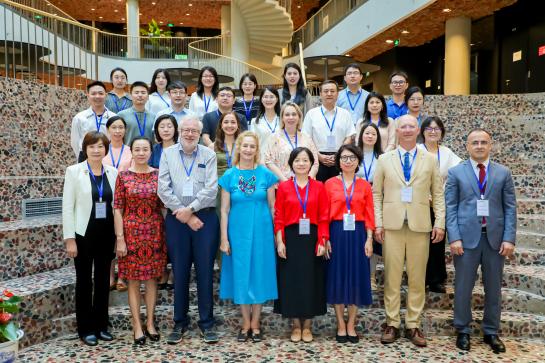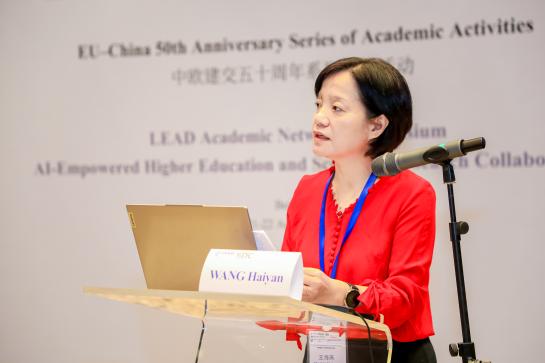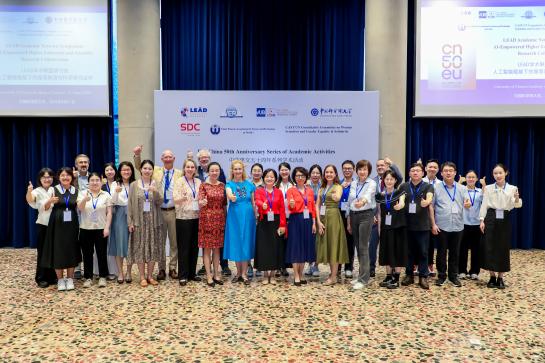
The LEAD Academic Network held a one-day symposium on “AI-Empowered Higher Education and Scientific Research Collaboration” at the University of Chinese Academy of Sciences (UCAS) on 21 August 2025. Under the auspice of the 50th anniversary of China–EU diplomatic relations, the event was co-organized by the Sino-Danish Center for Research and Education at UCAS, the World Education Research Association, the EU–China Higher Education Research Center, the China Women’s Association for Science and Technology, and the CAST UN Consultative Committee on Women Scientists and Gender Equality and Solidarity. The symposium gathered 30 university leaders, deans, and researchers from 13 institutions across Belgium, Turkey, Croatia, China, and South Africa to examine AI’s implications for academic leadership, teaching, and research.
Prof. Haiyan Wang, Dean of the Sino-Danish College at UCAS, welcomed participants and screened a short video highlighting the LEAD Academic Network’s contribution to EU–China higher-education cooperation. Prof. Hong Zhao, former Dean of the Sino-Danish College at UCAS, introduced the College and illustrated how EU–China initiatives translate into practice. In the opening address, Prof. Xuemei Yu, Vice President of Shanghai University and Chair of the LEAD Governing Committee, underscored cross-regional collaboration and LEAD’s continued efforts to advance responsible AI in higher education.
The morning keynotes, chaired by Anthony Antoine from Vrije Universiteit Brussel, explored AI from leadership, governance, and research perspectives. Prof. Marieta du Plessis from the University of the Western Cape emphasized psychological safety as the basis for inclusive AI adoption. Xiaqing Wang from the National Academy of Education Administration outlined Chinese perspectives on digital academic leadership. Prof. Yasar Kondakci and Dr. Sevgi Kaya Kasikci from Middle East Technical University presented digitalization strategies in Turkish universities. Yan Wang, Researcher from Beijing Foreign Studies University, mapped EU–China cooperation opportunities in the AI era. Dr. Xiaomin Li from Beijing Normal University framed AI as sub-symbolic systems with governance implications distinct from human decision-making. Prof. Melita Kovacevic from the University of Zagreb proposed a “Big Five” focus for AI-era research and called for critical and ethical integration of AI for research.
In the afternoon, Dr. Yiheng Xi from UCAS delivered a keynote on shifting research foci and the responsible implementation of AI research tools. The program then moved to two roundtable panel sessions. Roundtable Panel Session 1, moderated by Prof. Chang Zhu from Vrije Universiteit Brussel, focused on critical issues on education implementations: Anthony Antoine from School of Governance of VUB stressed AI literacy across curricula; Dr. Zhao Cheng from VUB applied a Responsible Innovation lens to AI integration barriers and good practice; Dr. Kai Wang from Beijing Normal University examined generative AI’s impact on teacher-educator identity; Prof. Xin Xing and Chenyang Tian from Yan’an University emphasized critical leadership through international capacity-building; Dr. Yiyi Cao from the National Academy of Education Administration outlined opportunities for vocational education, from language support to practice-based training.
Roundtable Panel Session 2, chaired by Prof. Marieta du Plessis from the University of the Western Cape, considered strategic and classroom-level implications. Prof. Cuirong Chen from China University of Geosciences (Wuhan) addressed governance dilemmas in educational-AI ethics. Prof. Jan Cornelis and Zhengwen Qi from VUB debated the continuing relevance of universities in the AI age and advocated lifelong and shared learning. Prof. Dike Zhang from China University of Geosciences (Wuhan) recast teacher roles as “magnetic conductors,” supporting students through AI-related challenges.
In closing remarks chaired by Prof. Yasar Kondakci, Prof. Melita Kovacevic called for responsible, strategic adoption of AI, a message echoed by Prof. Xuemei Yu and Prof. Haiyan Wang, who emphasized sustained international cooperation. Looking forward, the LEAD Academic Network will continue to deepen cross-regional collaboration, strengthen AI-enabled academic leadership, and advance ethical, evidence-based practice across partner institutions.



